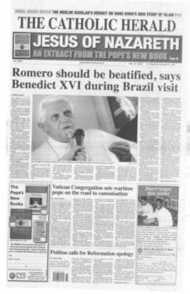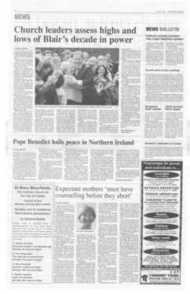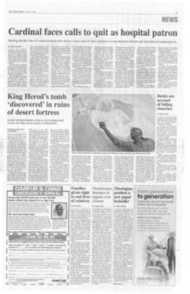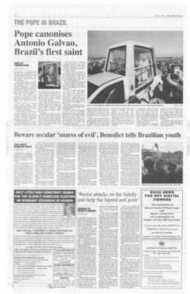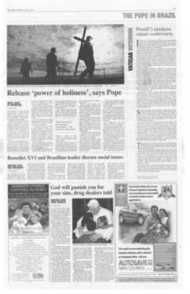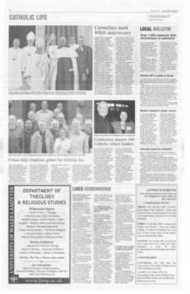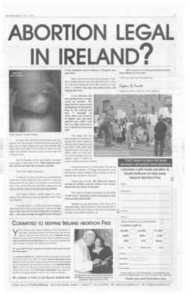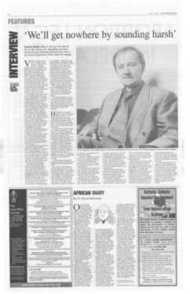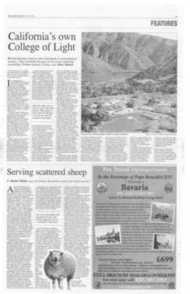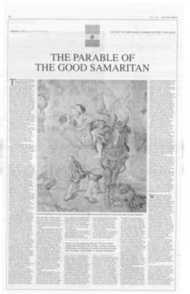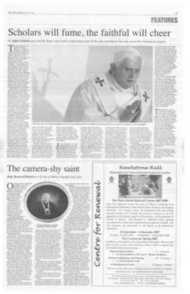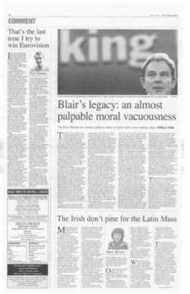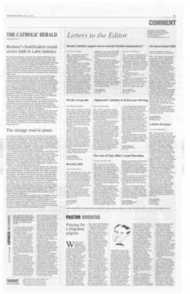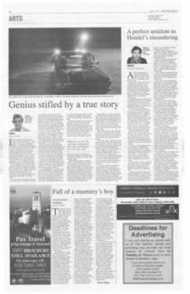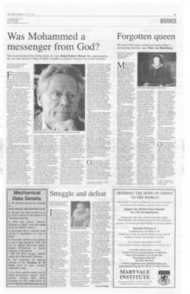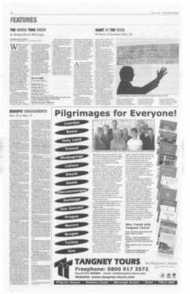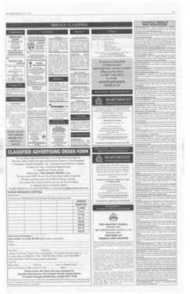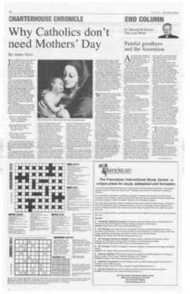Page 1, 18th May 2007
Page 1
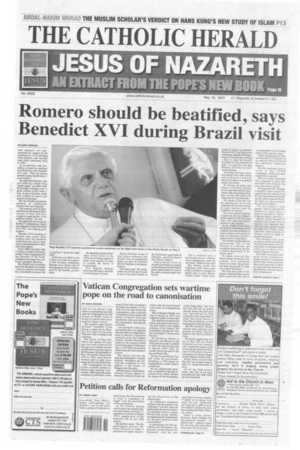
Report an error
Noticed an error on this page?If you've noticed an error in this article please click here to report it.
Tags
Share
Related articles
Romero Cause On Hold As Officials Study Whether He Died...
Romero Week In East Anglia
The Breathtaking Audacity Of Romero
Archbishop Romero Set For Sainthood
By Anabel Inge
Romero should be beatified, says Benedict XVI during Brazil visit
BY MARK GREAVES
POPE BENEDICT XVI has expressed his support for the beatification of Archbishop Oscar Romero, who was shot dead while celebrating Mass in 1980.
In an interview with journalists on board his chartered jet to Brazil last week, Benedict XVI said: "That the person himself merits beatification, I do not doubt."
He added that Romero, who was killed by a Right-wing "death squad" on orders from El Salvador's military, was "a great witness of the faith, a man of great Christian virtue who worked for peace and against dictatorship".
But the Pontiff said that the memory of Archbishop Romero had been hijacked.
"His memory must be liberated from the ideological deformations of those who have sought to appropriate it for political reasons," he said.
He added that the Cause for Romero's canonisation, which was opened by Pope John Paul II in 1997, was making good progress.
Benedict XVI's backing of Romero may cause some surprise since the murdered archbishop has always been seen as an inspiration to liberation theologians.
In the 1980s the Pope. then Cardinal Joseph Ratzinger, prefect of the Congregation for the Doctrine of the Faith, published documents that criticised Liberation Theology.
The Pontiff told journalists last week that these documents "were not aimed at destroying the commitment to justice but at guiding it along the right path".
Before he was killed at the Church of Divine Providence in San Salvador, Archbishop Romero was a severe critic of the oppression of his country's poor by the hardline government. He repeatedly criticised President Jimmy Carter in the 1970s for providing support to Right-wing regimes in order to combat the threat of Communism.
Two English bishops welcomed the Pope's decision to back Romero's Cause. Bishop Michael Evans of East Anglia explained that Romero was an inspirational figure not only for Catholics but for Christians of all denominations.
The bishop said: "He clearly stands out over the last 30 years as one of the great bishops of the Church and a great leader of Christians — not just for those in the Catholic Church."
Bishop Kieran Corry of Arundel and Brighton pointed out that Romero had the kind of global appeal lacked by most of the saints canonised under John Paul II. "He is someone who is universally known whereas most contemporary saints are very local," Bishop Conry said.
The bishop added that Catholics could relate more easily to Romero's struggle for justice than to more abstract "plaster saints" whose piety might be harder to emulate. Benedict XVI's in-flight press conference signalled the beginning of a five-day trip to Brazil — and to what the Pontiff described as "the continent of hope". It is the first time that Benedict XVI has travelled outside Europe.
On Friday the Pope canonised Brazil's first native-born saint in front of a crowd of almost one million at an airfield outside Sao Paolo.
St Antonio de Santa Ana G al vao (1739-1822), known for his deep faith and his association with extraordinary healings, was the 10th saint to be canonised by Pope Benedict.
The climax of the trip was the opening of a two-week conference of all of the bishops of Latin America and the Caribbean on Sunday.
They were gathered together at Aparecida, the site of Brazil's holiest shrine, for the first time since 1992, when John Paul II presided at the opening.
In his address Pope Benedict told the 200 bishops and 20 cardinals that the problems of Latin America were caused not only by Marxism but by a greedy form of capitalism.
The Pontiff said that Marxist governments left "a sad heritage of economic and ecological destruction, but also a painful destruction of the human spirit".
He added. however, that liberal market economies were pushing "ever increasing sectors of society" into poverty and depriving people of "their own natural resources".
The Pope also spoke of the dangers of globalisation. saying that it carried with it the "risk of vast monopolies and of treating profit as the supreme value".
Before addressing the bishops Benedict XVI presided at an open-air Mass in front of the enormous Aparecida basilica.
But the ceremony drew a crowd of only 150,000 worshippers, which was much smaller than expected.
The low turnout prompted Time magazine to argue that the Pope's tour of Brazil was not a spectacular success.
The magazine said: "Perhaps it shouldn't come as much of a surprise that the meeting of-an 80-year-old professorial pontiff and the often exuberant Brazilian flock was not an aroundthe-clock love affair."
The trip lacked a "bold gesture" such as John Paul II's donation of a papal ring to a parish in a shantytown "favela" in Rio de Janeiro, said Time.
Brazil's media focused on controversial issues such as abortion, the magazine said, after the Pope argued during his flight that Catholic politicians who voted in favour of abortion would be subject to excommunication.
His comments were made in support of Mexican bishops who raised the threat of excommunication immediately before politicians in Mexico City voted to legalise abortion.
The Pope's spokesman later made several clarifications, leading reporters to understand that the Pope meant to say that these politicians had in effect excommunicated themselves and therefore could not receive Holy Communion.
Editorial comment: Page 11
blog comments powered by Disqus


